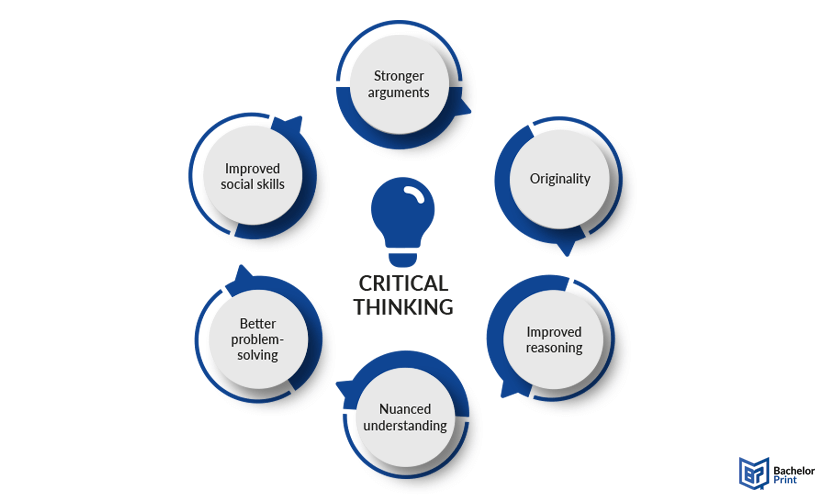
Critical thinking is a concept used in philosophy and academic writing to critically look at information or claims before accepting them. It involves using logic and reasoning to draw well-supported conclusions, rather than jumping to premature decisions. This article discusses the importance of critical thinking and its role when working with sources, as well as various tips, benefits, and examples.
Definition: Critical thinking
Critical thinking is a life skill that is imperative in everyone’s lives as it helps people think for themselves and avoid common thinking mistakes, called cognitive biases. Through critical thinking, individuals learn to identify biases — such as selection bias in the form of the cherry-picking fallacy and research bias during a study — seek various perspectives, and ask probing questions to get the full scope of available evidence. Especially nowadays, where complex choices and misleading information are very common, this skill is essential not only in academic or professional settings, but also in everyday life.
Benefits
Before we get into the nitty-gritty, let’s first talk about the benefits that come with critical thinking and how this can affect your everyday life.
- Stronger arguments: Critical thinking helps you build well-supported arguments that are also logically structured and harder to tear apart. This is especially useful in academic writing, debates, or defending your opinion in general.
- Originality: By questioning assumptions and digging deeper into issues, you move beyond surface-level thinking and start creating your own ideas. This makes your work or ideas more creative and unique.
- Improved reasoning: With higher levels of critical thinking, you learn to recognize flaws in arguments (both yours and others’) and avoid falling for faulty logic. Over time, this sharpens your ability to make fair and well-informed decisions.
- Nuanced understanding: Critical thinking immensely helps you see that most issues aren’t just black and white. You will therefore become more comfortable with complexity and more open to different perspectives, which leads to richer insights.
- Better problem-solving: Instead of reacting impulsively during debates or arguments, you learn to break problems down, evaluate possible solutions, and choose the most effective course of action. This is helpful in both personal and professional situations.
- Improved social skills: Critical thinking also makes you a better listener and communicator because you learn to consider other perspectives and put yourself in other people’s points of view before reacting. It also helps you navigate disagreements more respectfully, which builds healthier relationships and might influence others to do improve as well.

The 6 stages of critical thinking
Psychologists Linda Elder and Richard Paul identified six stages of critical thinking that they outlined in their book “The Miniature Guide to Critical Thinking: Concepts and Tools.” Over the years, this book has been revised several times, with the most recent edition published in 2019. Each one of the six stages of critical thinking are explained below, along with the following three example situations:
- One person in your group project isn’t doing their part.
- You’re wondering whether to end a long-term friendship that feels emotionally draining and one-sided.
- A person is trying to form an informed opinion about whether immigration laws should be stricter.

The unreflective thinker
People who autumn into this category don’t reflect on their thinking and are unaware of the impact it might have on their or other people’s lives. They form their opinions based on certain prejudices and misconceptions without applying accuracy, logic, or other intellectual standards.
Unreflective thinkers may have developed some skills in thinking without being aware of them; however, they are inconsistently applying them and may lack the skills to “fix” these issues. According to Elder and Paul, it’s possible to graduate from high school or college and still be a largely unreflective thinker.

The challenged thinker
People in this category are becoming aware that consequences can arise due to deficiencies in critical thinking because in order to solve a problem, you must first admit that you have one. They understand that their own mental processes have flaws, but they might not be able to detect all of them.
This means that challenged thinkers are able to reflect their own thinking and are actively trying to control their thinking about certain topics and situations they’re faced within their everyday lives; however, only in a limited capacity since they believe that their thinking is better than it actually is.

The beginning thinker
Beginning thinkers are actively working on their deficiencies (like egocentric thinking) when it comes to thinking, although they lack a proper plan on how to do so, leading to hit-or-miss results in changing their thinking and behaviour. They are more self-aware of their thinking processes and notice when underlying biases and assumptions cloud their judgment.
Nevertheless, emotions, such as defensiveness and frustration can still interfere with objective reasoning, and they don’t fully understand how to fix them yet. They will become more responsive to constructive criticism and feedback, and thus will try to adjust their way of thinking. At stage three, this intellectual trait emerges:
- Intellectual humility (Recognizing your limited knowledge & wanting to learn)

The practicing thinker
People at this level of thinking are learning to pay attention to how they think, not just what they think, and know that they need to fix these deficiencies systematically. Unlike beginning thinkers, practicing thinkers know what it would take to regularly check their thinking against important standards to see if it holds up as they will have developed some of the skills to do so.
However, a systematic plan still doesn’t exist, so they can still engage in self-deception and egocentric thinking. People typically don’t get to this experienced thinking stage until college and beyond, according to Elder and Paul.
Important traits to gain (but not perfected) at this level are:
- Confidence in reason (Trusting logic & evidence over opinions or peer pressure)
- Intellectual courage (Willing to face and consider other beliefs)
- Intellectual empathy (Ability to genuinely put oneself in someone else’s thinking)
- Intellectual integrity (Recognizing & addressing inconsistencies of thinking)
- Intellectual perseverance (Sticking with difficult problems, even when it’s hard)

The advanced thinker
Advanced thinkers show a high level of intellectual humility as they are strongly aware of their own thinking processes and will spot and revise prejudices in their own thinking. Thanks to their growing intellectual empathy, they can genuinely consider perspectives that differ from their own. They don’t just listen to respond — they listen to understand. This open-mindedness, combined with a commitment to objectivity, allows them to systematically work on improving their reasoning.
Importantly, advanced thinkers are capable of engaging with opposing views without feeling threatened. They approach disagreement not as conflict, but as an opportunity for learning and reflection.
At this stage, the thinker consistently demonstrates the following traits:
- Confidence in reason
- Intellectual courage
- Intellectual empathy
- Intellectual insight (Awareness of deeper structures like assumptions & biases)
- Intellectual integrity
- Intellectual perseverance

The master thinker
Master thinkers are entirely in control of their thinking and decision-making. They not only recognize biases and flawed reasoning; they anticipate and correct them with consistency. Master thinkers are especially skilled at managing egocentric and emotional impulses that often cloud judgment.
It’s safe to assume that psychologists are right when they say that most of us will never become master thinkers. However, the goal isn’t perfection, it’s progress. Even if we never become master thinkers, striving toward this level can transform the way we learn, communicate, and make decisions, whether that be in the academic realm or everyday life.
Fully developed intellectual traits include:
- Confidence in reason
- Intellectual autonomy (Thinking independently & forming your own well-reasoned beliefs)
- Intellectual courage
- Intellectual empathy
- Intellectual humility
- Intellectual insight
- Intellectual integrity
- Intellectual perseverance
How to improve your critical thinking skills
Improving your critical thinking starts with being actively curious and questioning the information you encounter, rather than passively accepting it. Below are practical tips to sharpen your critical thinking, especially in academic context. We will later get into a general context and how intellectual standards come into play.
- Question your sources thoughtfully: Ask yourself: Who wrote this? Why did they present it this way? How did they reach these conclusions? Reading critically means being alert to bias and gaps in logic.
- Consider the weight of evidence: Look at how widely supported a claim is and ask: Do most experts agree with this? Do they disagree with this, and why? This helps in pushing your thinking beyond surface-level conclusions.
- Form informed judgments: After gathering evidence, you need to form your own conclusions. This means making well-reasoned judgments based on evidence. So, ask: Are there patterns or gaps? What does the evidence really say?
- Write with purpose: Critical writing means using sources not just to fill space, but to support your analysis. When you describe something, there should be a reason. Ask yourself: How does this source support my argument? Am I analysing or just copying?
The nine intellectual standards
Thinking critically entails using the nine intellectual standards (based on the Paul-Elder framework) to determine the quality of reasoning. This means that students and others should ask questions instead of taking statements as they are, which in turn probe their thinking.
Below, you can find the nine factors of intellectual standards, along with examples and questions for the statement “Social media is ruining society because everyone is addicted to their phones.”
- Is that really true?
- How could we find out if that is true?
- How could we verify or test that?
- Do we need to look at this from another perspective?
- Do we need to consider another point of view?
- Do we need to look at this in other ways?
- Could you elaborate?
- Could you illustrate what you mean?
- Could you give me an example?
- What factors make this difficult?
- Does the answer address the complexities in the question?
- Is that dealing with the most significant factors?
- Is my thinking justifiable in context?
- Am I taking into account the thinking of others?
- Do I have a vested interest in this issue?
- Does all of this make sense together?
- Are you contradicting yourself?
- Does what you say follow from the evidence?
- Could you be more specific?
- Could you give me more details?
- Could you be more exact?
- How does that relate to the problem?
- How does that help us with the issue?
- How does that bear on the issue?
- Is this the central idea to focus on?
- Is this the most important problem to consider?
- Which of these facts are most important?
FAQs
Critical thinking is the ability to think rationally and independently. It involves analysing information, questioning assumptions, and making well-reasoned judgments based on evidence rather than emotion or opinion.
The 9 intellectual standards of critical thinking, as outlined by Paul and Elder, help evaluate the quality of thinking. They are:
- Clarity
- Accuracy
- Precision
- Relevance
- Depth
- Breadth
- Logic
- Significance
- Fairness
A critical thinker asks thoughtful questions, evaluates information before accepting it, and is receptive to other people’s viewpoints. They apply intellectual traits like humility, courage, empathy, integrity, and autonomy in their thinking and decision-making.
The six developmental stages of critical thinking, according to Paul and Elder, are:
- Unreflective Thinker
- Challenged Thinker
- Beginning Thinker
- Practicing Thinker
- Advanced Thinker
- Master Thinker